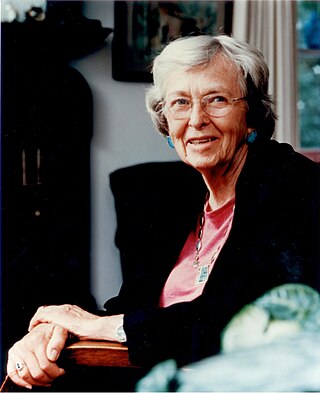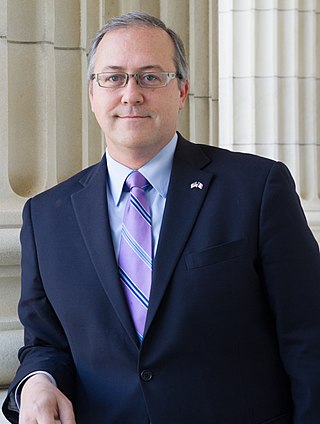Related Research Articles
A health system, health care system or healthcare system is an organization of people, institutions, and resources that delivers health care services to meet the health needs of target populations.

Health care, or healthcare, is the improvement of health via the prevention, diagnosis, treatment, amelioration or cure of disease, illness, injury, and other physical and mental impairments in people. Health care is delivered by health professionals and allied health fields. Medicine, dentistry, pharmacy, midwifery, nursing, optometry, audiology, psychology, occupational therapy, physical therapy, athletic training, and other health professions all constitute health care. The term includes work done in providing primary care, secondary care, tertiary care, and public health.

Charles Ernest Grassley is an American politician serving as the senior United States senator from Iowa, having held the seat since 1981. Grassley was first elected to the Senate in 1980 and has been reelected seven times. He is the longest-serving Republican in Congressional history and the sixth-longest-serving U.S. senator in history.
The Joint Commission is a United States-based nonprofit tax-exempt 501(c) organization that accredits more than 22,000 US health care organizations and programs. The international branch accredits medical services from around the world.

Des Moines University (DMU) is a private medical school in West Des Moines, Iowa. Founded in 1898, Des Moines University is the second oldest osteopathic medical school and the fifteenth largest medical school in the United States. DMU's three colleges—the College of Osteopathic Medicine, College of Podiatric Medicine and Surgery, and College of Health Sciences—offer nine academic degrees, including master's and doctorate degrees.
Primaris is a health care consulting company in Columbia, Missouri. Primaris has held the Medicare Quality Improvement Organizations contract for Missouri since the program was created.
Patient safety is a discipline that emphasizes safety in health care through the prevention, reduction, reporting and analysis of error and other types of unnecessary harm that often lead to adverse patient events. The frequency and magnitude of avoidable adverse events, often known as patient safety incidents, experienced by patients was not well known until the 1990s, when multiple countries reported significant numbers of patients harmed and killed by medical errors. Recognizing that healthcare errors impact 1 in every 10 patients around the world, the World Health Organization (WHO) calls patient safety an endemic concern. Indeed, patient safety has emerged as a distinct healthcare discipline supported by an immature yet developing scientific framework. There is a significant transdisciplinary body of theoretical and research literature that informs the science of patient safety with mobile health apps being a growing area of research.
A patient safety organization (PSO) is a group, institution, or association that improves medical care by reducing medical errors. Common functions of patient safety organizations are data collection, analysis, reporting, education, funding, and advocacy. A PSO differs from a Federally designed Patient Safety Organization (PSO), which provides health care providers in the U.S. privilege and confidentiality protections for efforts to improve patient safety and the quality of patient care delivery
The medical home, also known as the patient-centered medical home (PCMH), is a team-based health care delivery model led by a health care provider to provide comprehensive and continuous medical care to patients with a goal to obtain maximal health outcomes. It is described in the "Joint Principles" as "an approach to providing comprehensive primary care for children, youth and adults."

Mary E. Kramer is an American former politician. A member of the Republican Party, she served as an Iowa State Senator from 1990 to 2003. She was elected President of the Senate in 1997, becoming the first independently elected woman to fill the post. In 2003 Kramer was nominated by President George W. Bush to serve as U.S. Ambassador to Barbados and the Eastern Caribbean; she was confirmed by the United States Senate and served from 2004 to 2006.
National Coalition on Health Care(NCHC) is a coalition of groups working to achieve comprehensive health system reform. Founded in 1990 by Dr. Henry E. Simmons, M.D., NCHC is a non-profit alliance of more than 80 organizations.

Elaine Eisfelder Szymoniak was a State Senator from the U.S. state of Iowa, a former City Council Member representing the city of Des Moines, Iowa and a retired hearing and speech specialist, counselor, and administrator for the Iowa Department of Vocational Rehabilitation.

The State Library of Iowa is a library service in the U.S. state of Iowa. Founded in around 1840, it is based in Des Moines and is run by the Iowa Department of Education. The State Library supports local libraries in the state and it itself acts as a resource for the state government and its citizens. It is funded from local taxation.
Founded in 1971 as the Mississippi Foundation For Medical Care (MFMC), the Information & Quality Healthcare (IQH) is an independent, Mississippi, not-for-profit corporation. It was established by the House of Delegates at the 103rd Annual Session of the Mississippi State Medical Association. with an incorporation date of July 6, 1971. A grant from the National Center for Health Services Research and Development in 1971 allowed development of a physician-sponsored system for evaluating the quality of medical care. The primary goal was to improve the quality of medical care in the state and produce long lasting and tangible results. Programs such as the Experimental Medical Care Review Organization (EMCRO) and the Professional Standards Review Organization (PSRO) preceded the Peer Review Organization (PRO) designation which came on July 1, 1984.
AcademyHealth is a nonpartisan, nonprofit professional organization dedicated to advancing the fields of health services research and health policy. It is a professional organization for health services researchers, health policy analysts, and health practitioners, and it is a nonpartisan source for health research and policy. The organization was founded in 2000, in a merger between the Alpha Center and the Association for Health Services Research). In 2008, the organization had approximately 4000 health services researcher members.
The Medicare Physician Group Practice (PGP) demonstration was Medicare's first physician pay-for-performance (P4P) initiative. The demonstration established incentives for quality improvement and cost efficiency. Ten large physician groups participated in the demonstration, which started on April 1, 2005, and ran for 5 years. Previous funding arrangements, like the volume performance standard (VPS) and the sustainable growth rate (SGR) did not provide incentives to slow the growth of services. The Medicare PGP demonstration was intended to overcome that limitation in previous funding arrangements.
Health care quality is a level of value provided by any health care resource, as determined by some measurement. As with quality in other fields, it is an assessment of whether something is good enough and whether it is suitable for its purpose. The goal of health care is to provide medical resources of high quality to all who need them; that is, to ensure good quality of life, cure illnesses when possible, to extend life expectancy, and so on. Researchers use a variety of quality measures to attempt to determine health care quality, including counts of a therapy's reduction or lessening of diseases identified by medical diagnosis, a decrease in the number of risk factors which people have following preventive care, or a survey of health indicators in a population who are accessing certain kinds of care.
The Iowa Employer Benefits Study is an annual survey of Iowa employers conducted to determine the types and amounts of employee benefits offered by organizations in Iowa. The information collected in this research allows employers to understand the value of their benefit plans compared to state and industry averages. Iowa benefits can also be compared to those offered nationally. The Iowa Employer Benefits Study is recognized to be a trustworthy and credible resource on employee benefits offered in this state.

Wellmark Blue Cross Blue Shield is a mutual insurance in the United States with more than two million members in Iowa and South Dakota. It is the dominant health insurance in Iowa. It is an independent licensee of the Blue Cross Blue Shield Association. Founded in 1939, Wellmark offers dental and health insurance as well as life insurance. It began participating in the health care exchange for 2017.

David Edmund Young is an American politician who currently serves as a member of the Iowa House of Representatives from the 28th District, and previously served as the U.S. representative for Iowa's 3rd congressional district from 2015 to 2019. A member of the Republican Party, he is a native and resident of Van Meter, a western suburb of Des Moines. He was first elected in 2014 and reelected in 2016; he lost reelection in 2018 to Democrat Cindy Axne. Young unsuccessfully challenged Axne in 2020 in a rematch, losing by 1.3%.
References
- 1 2 Kauffman, Clark (March 19, 2007). "Foundation in Iowa uses questioned pay policies". The Des Moines Register. Gannett. pp. A1, A4. Retrieved December 30, 2018– via Newspapers.com. See also Article Part 2